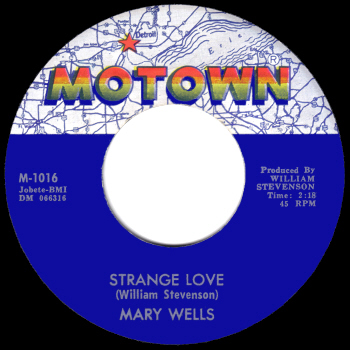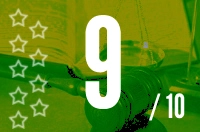Tags
 Motown M 1016 (A), October 1961
Motown M 1016 (A), October 1961
b/w Come To Me
(Written by Mickey Stevenson)
 Charismatic, sexy, big-voiced Mary Wells, Motown’s biggest solo star of the time, had had two straight R&B Top 10 hits with Bye Bye Baby and I Don’t Want To Take A Chance, and was riding the crest of a wave; her début album, imaginatively titled Bye Bye Baby I Don’t Want To Take A Chance, was already in the can awaiting its November 1961 release, and so now Berry Gordy greenlit her most expensive recording yet.
Charismatic, sexy, big-voiced Mary Wells, Motown’s biggest solo star of the time, had had two straight R&B Top 10 hits with Bye Bye Baby and I Don’t Want To Take A Chance, and was riding the crest of a wave; her début album, imaginatively titled Bye Bye Baby I Don’t Want To Take A Chance, was already in the can awaiting its November 1961 release, and so now Berry Gordy greenlit her most expensive recording yet.
Mickey Stevenson, one of Motown’s rising songwriting and producing superstars, had done a fine job co-writing I Don’t Want To Take A Chance, and Wells was now turned over to his control, with Stevenson both writing and producing this third single. He took a leaf from Smokey Robinson’s book and hired an outside arranger, Sammy Lowe, to drench proceedings in layers of lush strings (just as Smokey had recently done with Riley C. Hampton on Everybody’s Gotta Pay Some Dues).
 Finally, Stevenson wrote Mary a staggeringly-orchestrated, full-on emotional big ballad in the Etta James mould which called on her to give the best performance of her young career. She duly obliged, and the rest of the performers raised their games to match her; lead vocals, backing vocals, band, drums, strings, production, it’s all here and it’s all just about as close to bloody perfect as any Motown record had come in these first three years.
Finally, Stevenson wrote Mary a staggeringly-orchestrated, full-on emotional big ballad in the Etta James mould which called on her to give the best performance of her young career. She duly obliged, and the rest of the performers raised their games to match her; lead vocals, backing vocals, band, drums, strings, production, it’s all here and it’s all just about as close to bloody perfect as any Motown record had come in these first three years.
Galling, then, that this should turn out to be a resounding commercial flop. Far from scoring her another R&B Top Ten hit, Strange Love failed to make an appearance on any chart – the only single of Mary’s Motown career not to do so – and sold so disastrously few copies that Mickey Stevenson was promptly removed from the Mary Wells project, a promising partnership cut short before it had a chance to get started. Mary would henceforth be transferred to the care of Smokey Robinson, who was keen to up his workload as a writer/producer outside the Miracles; the rest, as they say, is history, and the listening public in Sixties America quickly forgot this record ever existed at all.
But the listening public in Sixties America, it transpires, could be cloth-eared morons of the first stripe. This is a brilliant record, played with passion by the band – who know just how good a job they’re doing, their confidence beaming through the speakers – and sung quite superbly by Mary, who even sells a comic fake laugh at 0:26 – and all those funny, funny things you do, “ha ha ha”, dripping with disdain, making it abundantly clear she doesn’t find her man’s infuriating behaviour amusing in the slightest, when a lesser vocalist would have ruined the moment – before blasting the chorus into the stratosphere.
 The chorus only consists of the word “you”, stretched out melismatically over seven or eight syllables and sung at the very top of Mary’s register – but she deals with it in her stride and hits it perfectly every time. Such ambition would have been unthinkable for a Motown session even a year previously, but boundaries were being pushed all the time, and this record is rich evidence of just how far things had come.
The chorus only consists of the word “you”, stretched out melismatically over seven or eight syllables and sung at the very top of Mary’s register – but she deals with it in her stride and hits it perfectly every time. Such ambition would have been unthinkable for a Motown session even a year previously, but boundaries were being pushed all the time, and this record is rich evidence of just how far things had come.
Mary’s vocals throughout the song are nothing short of fantastic. Her raw throatiness is instantly appealing, especially the slight rasp of hoarseness at 2:14 when she pronounces “all my love” with a strong H at the start, calling to mind her great performance on Bye Bye Baby, and she’s never less than totally believable.
It’s easy to see why she was such a big star.
If there’s anything wrong with this record, it’s that it fades out too soon, going quiet just as Mary works up to her big finish; but that’s a minor niggle. One of the very best of all Mary Wells’ many great records, this should have been a platform for her to ascend from “mere” stardom to total world-beating superstardom; instead, after this catastrophic unexpected flop, she would have to wait almost three years for that breakthrough (with 1964’s My Guy), and she would end up throwing her career away by ditching Motown just at the moment her winning numbers came up.
MOTOWN JUNKIES VERDICT
(I’ve had MY say, now it’s your turn. Agree? Disagree? Leave a comment, or click the thumbs at the bottom there. Dissent is encouraged!)
You’re reading Motown Junkies, an attempt to review every Motown A- and B-side ever released. Click on the “previous” and “next” buttons below to go back and forth through the catalogue, or visit the Master Index for a full list of reviews so far.
(Or maybe you’re only interested in Mary Wells? Click for more.)
 |
 |
| Joel Sebastian “Blue Cinderella” |
Mary Wells “Come To Me” |


Lady Motown in a very underrated dramatic delivery produced by Mickey Stevenson. She strayed from dance music with unexpected disastrous results as this number interrupted a career in progression. Shame because the song is beautifully arranged with Mary giving it a blues rendering replete with an oh-so anti-climatic chuckle during the first verse at her Strange Love(r).
LikeLike
“Lady Motown”, I like that.
LikeLike
Have been enjoying this immensely since your splendid essay persuaded me to track it down. A magnificent song, too, with those trajectories into the stratosphere at the end of each verse. Mary seems to have been quite at home up there – I recall the dizzying operatic heights of ‘Oh Little Boy’ – prefiguring Minnie Riperton? A shame that she didn’t get to spend more time above the staff..
LikeLike
>> A magnificent song, too, with those trajectories into the stratosphere at the end of each verse. Mary seems to have been quite at home up there – I recall the dizzying operatic heights of ‘Oh Little Boy’ – prefiguring Minnie Riperton? <<
According to the 1964 CMS, on "Oh Little Boy" that high note is a cameo by none other than Liz Lands! I always wondered about that because I didn't think Mary could have gone quite that high for so long. When I purchased the '64 volume, a long-time mystery was solved for me.
That said, on "Oh Little Boy" Andre Williams (the producer) really got an intense, emotional performance out of her. And it's quite the opposite of the coy, sweet "My Guy" flip. I'll be interested in seeing what our host has to say about that track. Really underrated.
LikeLike
MOTOWN wasn’t about ballads, it was about exciting, drum-beating songs that made you want to move, irrespective of the qualities of the recording. Our Calif station only played Come To Me, so I’m sure this side of my record is still unscratched!
LikeLike
In an attempt to explain the “galling commerical flop” you bemoan, I would point to the awkward rhythm on the word “experiencing” in the first line. You could get away with that later in a track, but right out of the gate it’s a bit of an albatross. The second verse doesn’t have the problem (“strange romance, they say I’ll never ever have a chance”). Maybe they should have flipped the verses and changed the name of the song to Strange Romance – or enlisted Smokey or some other in-house wordsmith to come up with a better word flow to replace “experiencing”.
LikeLike
I LOVE this song. Mary could sing ballads just as well as mid-tempos and up-tempos. I’m not sure I’d give it a “9”. But, I think it’s a solid “8”. I LOVE the way Mary pronounces “expirrencing” and “aksk”. I hate to think that such “Africanisms” would hurt Pop sales. It’s just that ballads had to be super, or super quirky, full of hooks, or have super-interesting lyrics to make it at that time. This was a well-written song, with a well-played instrumental, well sung, but just didn’t have a differentiating selling point tom make it stand out.
LikeLike